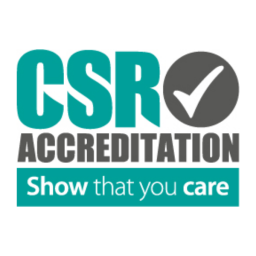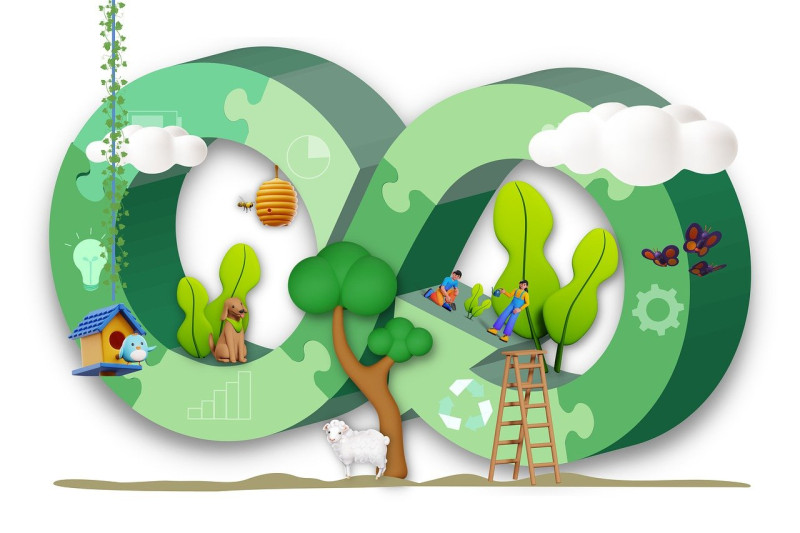With the increasing awareness of consumers, both in public and business domains, around sustainability, SMEs need to consider how to market their ethical practices, including products, sustainable sourcing, and corporate social responsibility (CSR) initiatives.
One barrier that is frequently voiced in relation to creating and communicating this narrative is a fear of accusations of greenwashing, blue rinsing, and not being se n as authentic. With clarity, transparency and careful planning marketing sustainability and ethical practices can not only ‘better’ the organisation in terms of becoming more responsible, and thereby sustainable as an entity, but also harness key differentiators in competitive markets and attract a loyal customer base that values sustainability.
Embracing Sustainability
As global awareness around environmental and social issues continues to grow, sustainability is more than just a trend and is becoming a critical factor in B2C (Business to Consumer) and B2B (Business to Business) decision-making. Some SMEs in the UK and beyond are recognising that their commitment to ethical practices can significantly influence their success in today's competitive market.
In addition, research shows that consumers are increasingly wanting to support organisations that share their values, particularly around sustainability and ethical practices in terms of sourcing, reusability, recyclability, and life cycle longevity.
For SMEs, this presents both a challenge and an opportunity:
How do you effectively communicate a commitment to sustainability in a way that resonates with consumers and sets them apart from competitors without that fear?
Products: Marketing the Specifics
One of the most direct ways SMEs can demonstrate their commitment to sustainability is through the products and services they offer. Eco-friendly offerings, which are designed to have a minimal environmental impact, are becoming higher in demand. This includes items made from recycled materials, products that are biodegradable or compostable, and those that use minimal or no plastic packaging.
Marketing eco-friendly products goes beyond simply labelling them as "green" or "sustainable." It is vital to clearly communicate the specific environmental benefits of products, for example, highlighting how a product reduces waste, conserves resources, or has a smaller carbon footprint. In return, this information can make a compelling case to eco-conscious consumers.
Additionally, transparency is key. Customers appreciate knowing where materials are sourced from, how products are manufactured, and an organisation’s choices for each.
Sustainable Sourcing: Building Trust and Credibility
Sustainable sourcing is another critical aspect of ethical business practices that SMEs can leverage in their marketing. This involves ensuring that raw materials are obtained in a way that is environmentally responsible and socially equitable. For example, a coffee shop that sources its beans from fair trade-certified farms not only supports ethical labour practices but also appeals to consumers who prioritise sustainability and fairness to all.
Communicating sustainable sourcing practices can help SMEs build trust and credibility with their customers, through product packaging, in-store signage, and digital content such as blog posts, social media updates and their website.
Sharing the stories of the people and communities behind the products can also create a deeper connection with consumers.
CSR Initiatives: Making a Positive Impact
CSR initiatives are another powerful way for organisations to demonstrate their commitment to sustainability. CSR can take on many forms, from charitable donations and community involvement to reducing a company’s carbon footprint and implementing sustainable business practices.
For SMEs, effective CSR initiatives should align transparently with their core values and resonate with their target audience. Whether it's participating in local environmental clean-ups, supporting renewable energy projects, or donating a portion of profits to environmental causes, these actions can significantly enhance a brand's reputation and asset value.
Marketing CSR initiatives involve more than just promoting these activities; it requires engaging storytelling that showcases the true impact of the efforts. Customers want to see tangible results and know that the businesses they support are genuinely making a difference, not just ticking a box or donating money for vanity and PR purposes.
Sustainability as a Key Differentiator
In increasingly crowded markets, sustainability is becoming a key differentiator for SMEs. While price and quality remain important factors, many consumers are now willing to pay a premium (but perhaps buy less frequently) for products and services that align with their values. By positioning themselves as sustainable businesses, organisations can tap into this growing market segment.
It's essential for SMEs to integrate sustainability as a key pillar into their overall brand identity and ensure it is at the top of the agenda at all times, alongside financial performance, employee engagement and stakeholder satisfaction
This means that sustainability should be reflected not only in marketing campaigns but also in everyday business operations and decision-making processes throughout the organisation, thereby truly embedded in the culture.
Consistency is crucial; any gap between what a business claims and what it practices can lead to consumer distrust, accusations of greenwashing and devastating brand damage.
Effective Marketing Strategies for Sustainability
However, there are ways to successfully market ethical practices and sustainability progress to avoid any negative disruption.
Organisations can consider the following strategies:
1. Storytelling: Share the journey of your sustainability efforts. Whether it's the initial aims, challenges faced, or the milestones achieved, authentic and clear storytelling helps connect with customers on an emotional level.
- 2. Transparency: Be open about your practices, sourcing, and impact. Providing detailed information about the steps being taken to ensure sustainability builds trust. Embrace those that are done well, and those that are work in progress or require next stage intention.
- 3. Community Engagement: Involve your wider stakeholder audience, such as your customers, local communities, business communities, industry value chain, supply chain and local authorities in your sustainability initiatives. This could include encouraging them to participate in eco-friendly practices, imparting your knowledge and influence, listening boards, or offering incentives for sustainable behaviour.
- 4. Certification and Labels: If appropriate, obtain certifications such as Fair Trade, Organic, B Corp or Carbon Literacy to validate your sustainability claims. This proof of knowledge and involvement provides credibility and assurance to consumers.
- 5. Leverage All Marketing Platforms: Use social media, blogs, and email newsletters to regularly update your audience on your sustainability efforts. Ensure any events you attend your brand collateral and merchandise reflect the values that you hold close, or even your progress on the sustainability journey. Visual content like videos and infographics can be particularly effective in conveying your message.
In conclusion, as sustainability becomes increasingly important to consumers, irrelevant of their personal or business status, those organisations that embrace and effectively market their ethical practices and progress towards being more responsible can gain a competitive edge.
By offering eco-friendly products, committing to sustainable sourcing, implementing meaningful CSR initiatives, and conveying these with clarity, authenticity, proof and transparency these businesses can attract and retain customers who value sustainability.
In a world where consumers are more informed and conscious of their purchasing decisions than ever, SMEs that prioritise sustainability are not only doing the right thing for the planet but are also positioning themselves for long-term success. By telling their story, being transparent, and engaging with their community, these businesses can turn their commitment to sustainability into a powerful marketing tool that drives growth and builds brand loyalty.
You can connect with me by sending me a
message or find me on LinkedIn.
 Tender Response Limited
Tender Response Limited




